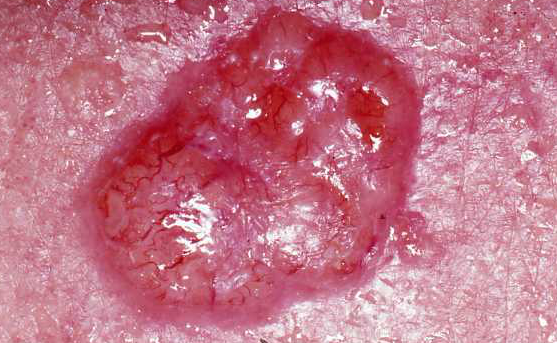Hydrochlorothiazide and non-melanoma skin cancer: How come?

Last Updated on February 2, 2019 by Joseph Gut – thasso
February 02, 2019 – This is potential alarming news for millions of patients worldwide suffering from high blood pressure: Health Canada has just completed a safety review of hydrochlorothiazide and has found that prolonged use of the drug could increase a person’s risk for non-melanoma skin cancer.

Hydrochlorothiazide is a prescription drug used to treat high blood pressure and swelling. It is known to make skin more sensitive to ultraviolet radiation and sunlight, meaning patients can get sunburned more easily.
Health Canada reviewed the best available evidence on the issue. Findings suggest an increased risk of non-melanoma skin cancer for patients who have used hydrochlorothiazide for more than three years. However, it is important to note that the studies reviewed had significant limitations. For example, there was a lack of patient data on sun exposure and severity, and duration of high blood pressure. Such data could help clarify the cause of the increased risk. In light of these findings, Health Canada has concluded that prolonged use of hydrochlorothiazide may be associated with a risk of non-melanoma skin cancer that is at least four times the risk of not using hydrochlorothiazide.
Because of the seriousness of this risk and the wide use of this drug, Health Canada is taking a precautionary approach and is working with manufacturers to update the Canadian product safety information to reflect this new risk. Health Canada will continue to monitor the safety of hydrochlorothiazide to identify and assess risks, as it does for all health products on the Canadian market. Health Canada will take appropriate and timely action if any new health risks are identified.
The findings of Health Canada are particularly serious in the light of the fact that Hydrochlorothiazide is not only widely taken by patients suffering from high blood pressure, but is also part (ingredient) of very many medications worldwide taken by millions of patients for the same (high blood pressure) indication. Such combination medications may include, but are not restricted to Exforge HCT, to name to name just one, and many, very many other combinations with any other type of sartan-type of drugs. As it happens to be, just in the course of the last couple of months, the sartan-type of drugs such as valsartan, irbesartan, and others have come under scrutiny for cancer-inducing contaminants (see here for some of the evidence). So, the combination medicines of a presumed cancer-facilitating ingredient (i.e., hydrochlorothiazide) and partners with potentially cancer-causing contaminants (i.e., the sartan-type of drugs such as valsartan, irbesartan, and others) may pose, over the long term of their use, a very “explosive” type of treatment for one chronic condition (i.e., high blood pressure) with all its associated serious health risks by replacing it with another, not less serious health risk, namely cancer.
In any case, Health Canada provides important safety information for patients when it comes to hydrochlorothiazide, which may also apply to hydroschlorothiazine containing drugs, such as
- talk to your healthcare provider or pharmacist if you are using hydrochlorothiazide and have any concerns regarding your risk for non-melanoma skin cancer.
- inform your healthcare provider if you identify any new skin lesions, such as moles or changes to existing skin lesions.
- limit your exposure to sunlight and avoid using tanning equipment as it can increase the risk of non-melanoma skin cancer. Use adequate protection when exposed to sunlight (e.g., sunscreen with SPF 30 or higher, clothing, and a hat).
- talk to your healthcare provider if you think that you may be at a particularly higher risk for non-melanoma skin cancer (e.g., if you have light-coloured skin, if you have a personal or family history of skin cancer, or if you are receiving ongoing immunosuppressive therapy).
Along the same lines, Health Canada has some important informations for healthcare providers:
- research findings suggest an increased risk of non-melanoma skin cancer with prolonged use of hydrochlorothiazide. However, because of important limitations in the studies, substantial uncertainty remains regarding these findings.
- patients taking hydrochlorothiazide should be informed of the risk of non-melanoma skin cancer. They should be advised to regularly check their skin for new lesions or changes to existing ones, and to report any suspicious skin lesions to their healthcare provider.
- patients taking hydrochlorothiazide should be advised to limit exposure to sunlight, avoid using tanning equipment, and use adequate protection (e.g., sunscreen with SPF 30 or higher, clothing, and hat) when exposed to sunlight to minimize the risk of non-melanoma skin cancer.
- alternatives to hydrochlorothiazide may be considered for patients who are at particularly higher risk for non-melanoma skin cancer (e.g., patients who have light-coloured skin, who have a personal or family history of skin cancer, or who are receiving ongoing immunosuppressive therapy).
You may want to take, as a patient, treating physician, or any kind of healthcare provider, all these aspects into consideration before entering high blood pressure lowering therapy, knowing that incidences of actual cancer cases attributable to hydrochlorothiazide or related drugs are rare, of course. But, you can not know, at present, if you could be affected. So, the decision is not a easy one, particularly since untreated high blood pressure in itself is also carrying some rather serious health risks.

